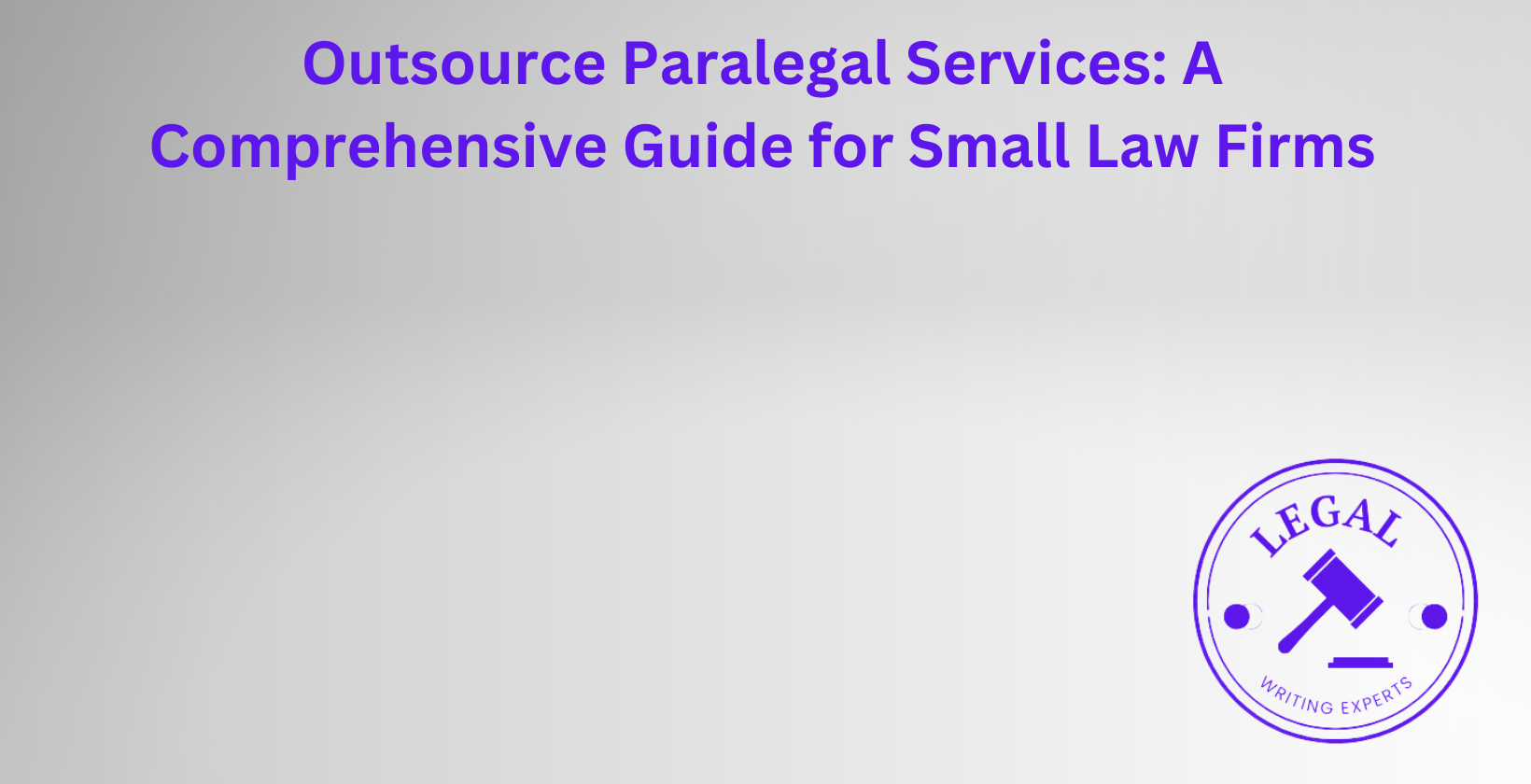Outsource Paralegal Services: A Comprehensive Guide for Small Law Firms
Written by
Jessica E
November 30, 2024 · 8 min read

Outsourcing paralegal services offers small law firms a strategic advantage in managing legal tasks without expanding in-house staff. This guide explores the fundamental aspects of outsourced paralegal services, detailing their benefits, typical responsibilities, cost considerations, and essential steps to ensure confidentiality, legal compliance, and effective integration into an existing workflow. By understanding how to select, incorporate, and assess outsourced paralegal services, law firms can streamline their operations and focus on more complex legal needs.
What Are Outsourced Paralegal Services?
Outsourced paralegal services involve contracting with third-party paralegal professionals or firms to perform specific legal tasks for a law firm. These services provide law firms with skilled paralegal assistance without hiring permanent in-house staff, making them particularly advantageous for small firms. Outsourced paralegals handle various support functions, allowing attorneys to concentrate on strategic areas of law.
How Do Outsourced Paralegal Services Benefit Small Law Firms?
Outsourced paralegal services benefit small law firms by providing cost-effective access to skilled legal support. Small firms often face limitations in resources, which can restrict their ability to handle a large caseload or take on complex projects. By outsourcing, these firms gain flexibility, adapting to workload fluctuations without committing to full-time hires. In addition, outsourced services enable firms to manage caseloads efficiently, improving client satisfaction and profitability.
What Tasks Can Be Delegated to Outsourced Paralegals?
Tasks that can be delegated to outsourced paralegals include research, document preparation, case management, and client communication. For example, outsourced paralegals often draft pleadings, prepare contracts, and compile case files. These professionals can conduct legal research and summarize findings, supporting attorneys in building cases. Delegating administrative tasks to outsourced paralegals allows attorneys to focus on legal strategy, reducing time spent on routine paperwork.
How Do You Choose the Right Outsourced Paralegal Service Provider?
Choosing the right outsourced paralegal service provider involves evaluating expertise, reliability, and specialization. Firms should assess potential providers’ experience in the relevant area of law, reviewing case studies or testimonials as indicators of performance. A reputable provider will have qualified paralegals with certifications or experience in specific legal fields. Conducting interviews, assessing responsiveness, and verifying references are essential steps in selecting a service provider that aligns with the firm’s values and standards.
What Are the Cost Implications of Outsourcing Paralegal Services?
Outsourcing paralegal services costs less than hiring full-time employees due to the elimination of expenses like benefits, insurance, and office space. Small firms generally pay a fixed or hourly rate for outsourced paralegal support, offering flexibility to scale services based on workload. For instance, outsourced services can reduce labor costs by up to 40%, allowing firms to allocate resources more effectively. Cost-effectiveness is a core advantage for small firms seeking high-quality support without exceeding their budget.
How Do You Ensure Confidentiality and Security When Outsourcing?
Ensuring confidentiality and security when outsourcing requires strict policies and thorough vetting. Confidentiality agreements and non-disclosure contracts are essential to protect sensitive client information. Firms should verify that the provider adheres to data protection standards and uses secure communication methods. Encryption and secure cloud storage can help safeguard case files and communication channels. By implementing stringent security protocols, law firms can mitigate risks related to unauthorized data access.
What Are the Legal and Ethical Considerations in Paralegal Outsourcing?
Legal and ethical considerations in paralegal outsourcing revolve around maintaining compliance with professional conduct standards. The American Bar Association (ABA) mandates that attorneys supervise outsourced paralegals to ensure ethical obligations are met. This includes monitoring work quality, as attorneys remain accountable for client services. Additionally, outsourced paralegals cannot provide legal advice or represent clients in court, making it crucial for law firms to define boundaries and communicate expectations clearly.
How Do You Integrate Outsourced Paralegals into Your Existing Workflow?
Integrating outsourced paralegals into an existing workflow involves clear communication, structured onboarding, and defined responsibilities. Establishing regular communication protocols, such as weekly check-ins or project updates, ensures alignment. Providing training on internal processes and legal requirements streamlines integration. Tools like shared calendars and project management software facilitate coordination, allowing outsourced paralegals to work seamlessly within the firm’s operations.
What Are the Common Challenges in Paralegal Outsourcing and How Can They Be Overcome?
Common challenges in paralegal outsourcing include miscommunication, lack of accountability, and potential data security risks. Effective solutions involve setting expectations early, conducting regular performance evaluations, and establishing clear roles. For instance, defining project scopes and deliverables at the outset prevents misunderstandings. By maintaining open lines of communication and using secure data management practices, firms can address and mitigate these challenges successfully.
How Do You Measure the Success of Outsourced Paralegal Services?
Success of outsourced paralegal services is measured by assessing productivity, accuracy, and client satisfaction. Tracking metrics such as task completion rates, error reduction, and response times provides insight into the service’s effectiveness. Client feedback can reveal areas of improvement or success, helping firms refine their outsourcing strategies. By regularly evaluating these metrics, law firms ensure that their outsourced paralegal services continue to support their objectives and deliver value to their clients.
Meet the Author
Distinguished linguist at Legal Writing Experts
Jessica is an expert legal writer with a remarkable blend of legal knowledge and linguistic precision. She earned her Juris Doctor degree from Duke University, where she attended on a prestigious Law Faculty Merit Scholarship. At Duke, Jessica demonstrated her exceptional abilities by serving as an editor of the Duke Law Review.
After graduating, Jessica further refined her skills during a two-year appellate clerkship at a distinguished law firm in North Carolina. Throughout law school, she enhanced her research and writing expertise as a research assistant and writer for various legal firms. Jessica’s deep understanding of legal language and meticulous attention to detail make her an invaluable asset to our legal writing services.


